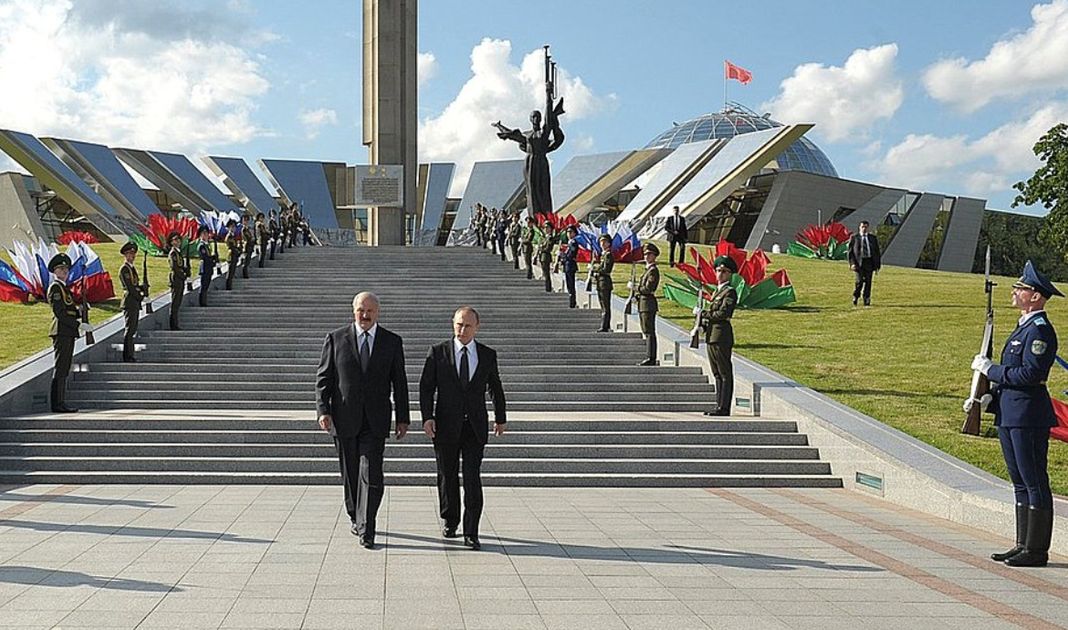Intermarium Weekly 17-23.06.2020

(kremlin.ru)
Belarus
The political situation in the country is changing dramatically and dynamic events are underway, therefore it is worth undertaking a more detailed analysis of the situation in Belarus. The “last dictator of Europe” is facing a tremendous historical challenge to his rule and the democratic opposition feels that now is the exact time to act and change the situation. However, it is unknown whether any changes ushered in would be for the better and there is a big potential for unpredictable scenarios with major geopolitical repercussions.
The justice system of Belarus is overloaded by politically motivated cases and the numbers are only increasing as we move closer to Election Day, which is to say that the number of political prisoners in the country is increasing. The authorities are augmenting repressions against the opposition and ordinary people who do not agree with the current political regime. In many regions of the country, blockings of mobile coverage and internet connections have been noticed, especially in areas where there have been anti-government demonstrations.
After the signature collection phase, seven people continue to participate in the presidential election. The chairman of the Central Election Commission, Lidia Yermoshina, said on June 22 that seven people had passed signatures for verification. According to her, the collected signatures were sent by Alexander Lukashenko, Viktor Babariko, Valery Tsepkalo, Svetlana Tikhanovskaya, Anna Kanopatskaya, Andrey Dmitriev and Sergey Cherechen. Yarmoshyna also noted that the exact number of signatures handed in from each applicant will be determined based on the results of the verification. Verification will be completed on June 30.
According to many different unofficial polls, Babariko and Tsikhanouskaja are the leading candidates for the presidency and the share of Lukashenka in these polls is less than 5%. Of course, these are not official and representative numbers and elections in recent years have shown a huge difference between the polls and the real results, but nevertheless it would be worth trying to understand the political nature of the main possible opponents of Lukashenka in the upcoming Presidential Elections.
Lukashenka has reacted aggressively to the events that are now happening in his country. It should be stated that he knew that such a situation was going to occur in the near future and it seems that he is prepared for different scenarios. He claims that under the pretext of democracy “fascists” are aiming to come to power in Belarus. Speaking on June 22 to the fighters of the 38th Brest Separate Guards Airborne Assault Brigade, the incumbent spoke about the tasks of the army in the current political situation.
Lukashenka reminded the paratroopers about the recently updated military doctrine of Belarus, which was brought into line with modern challenges. “Once again I remind you: we will not fight front to front, there is no such war. These are local wars. And hybrid wars. This is not only shooting (this is later). It starts with information wars, and we see it today.” Military formations, as we can see, are the last resort of Lukashenka against the revolutionary forces in the country. He straightforwardly emphasized that, “In the current situation, the task of the army and special operations forces is, first and foremost, the defense of the Fatherland, the maintenance of stability and harmony in society. Here is my order for you – Do your best to protect sovereignty and ensure the security of our state.” Those people who are “against Belarus,” he indicated, use “democratic rhetoric” merely as a pretext.
Babariko’s strategy
Just a couple of days before his arrest, Viktor Babariko presented his strategy for the upcoming several months, both in case of positive or negative scenarios. He emphasized that the searches in his house and office were politically motivated and he accepted that the situation for him is going to be much worse than it was. According to him, the following steps must be conducted:
- To gather signatures for the nomination. Whilst the searches have interrupted this process, more people have now signalled a willingness to lend Babariko their support. He is using this signature-gathering process to position himself as a figure of political influence and importance. Almost half a million signatures have already been collected for Viktor Babariko. Lukashenka has 1,5 million; On June 20 his team transferred all signatures to Election Committee;
- In the second stage, from June 19 to July 14, it is planned to announce new initiatives related to registration;
- Babariko’s political program is targeting middle class Balarussians, and this is a significant blow to Lukashenka because all previous decades, the opposition represented mostly marginal groups of Belarusian society.
- The third stage is registration: “they may or may not register me as a candidate” says Babariko. He has accepted the possibility that he is not going to be registered but according to his logic, in Belarusian history there has never been such a situation in which a candidate that has collected 100,000 signatures is pushed out of the elections. If this does happen, he has a strategy for such a scenario.
- During the campaign period, the team of Babariko plans to use digital tools to the maximum and “reach every village in Belarus.”[1]
- In prison, Babaryko has developed his strategy. Now he is calling for a nationwide referendum to amend the Constitution of Belarus (to restore the constitution of 1994, with limited powers of the president). According to his logic, if more than 400 thousand signatures were collected in the course of a month for his support, then it will not be a big problem to collect 450 thousand people over the next two months, to initiate the constitutional changes. He may really desire such changes but behind this initiative, there are tactical reasons, as people will mobilize and unite around one particular issue (and against one particular person).
Eventually, Babariko was put into detention and the persecution has continued, but this time against his supporters. Authorities blocked the account of the election fund of Victor Babariko. However, Babariko’s supporters have not given up and have initiated the collection of signatures for his release from custody. They have already collected more than 100,000 signatures. Russian journalists have taken particular interest in covering Babariko’s campaign. All in all, for Lukashenka and his supporters, Babariko is nothing but a “Kremlin project”. Recently the head of the State Control Committee, Ivan Tertel, very close and loyal to Lukashenka, stated about those who support Babariko, “Such personalities are, we know, the big bosses at Gazprom, and maybe even higher.” The higher level can be only an allusion to Vladimir Putin or Dmitry Medvedev and the various factions around them. On 20th June it was announced that Babariko had been charged under Criminal Law. It is a specific logic of the regime to present him as a corrupted and criminal person.
The Factor of Tsikhanouski’s Family
Syarhei Tsikhanouski is a famous Belarusian blogger who recently announced his plans to become President of Belarus. Alexander Lukashenka’s answer was predictable; he did everything in order to prevent the potential candidate from becoming a candidate and his direct opponent. He ordered searches in the office and house of the blogger and eventually created the image that the blogger is financed by foreign countries. Notwithstanding all Lukashenka’s efforts, Tsikhanouski has found a way to continue his electoral campaign. He registered his wife as a candidate in the upcoming elections. Now his wife is a potential candidate and he personally – until the end of June – will be in detention.
The Activities of Civil Society
Since May political life in Belarus is shaking and becoming nervous and violent. Belarussians are organizing chains of solidarity all-around the country and for authorities, this is a huge challenge because interruption of such activities can easily evolve into violent protests. During these rallies, more than 100 people have been arrested. We can anticipate escalations from either side, including the side of opposition, which feels that this is the right chance to change the situation in the country. The pro-Lukashenka side knows that the situation is against them and they stand to lose a lot in the case of a political transition. The fate of Viktor Yanukovich has set a precedent, the spectre of which now looms ominously over the current government. Many people have been placed in detention or are under various kinds of police control.
For protesters, any of the candidates opposing Lukashenka are a better solution than seeing him return to power. In different cities, big rallies have been organized in support of arrested political activists and candidates so as to demonstrate solidarity with them.
The authorities have been reacting very nervously to the activities of Western journalists and are threatening to terminate their work in the country. The most active journalists are those from Poland-based “Belsat” TV and Radio Free Europe.
International Factors
Lukashenka is playing a difficult balancing game. From both sides, he faces pressure. From one side, the leftist-liberal opposition supported by the West; and from the other, a candidate that – according to his vision – is a “Kremlin puppet”. Russia is so smartly using the “maidan technology” for achieving its geopolitical goals. It is possible to assume that Lukashenka would like to negotiate with the West about his future. Maybe he would like to “scare” the West by using the pro-Russian Babariko candidacy in order to position himself as a “better the devil you know” who can operate relatively independently. The European Union is concerned about the future of Babariko and the MFA has called the EU Ambassador to discuss his detention. The head of State Control Committee Ivan Tertel was present at the meeting and again repeated that Babariko was arrested because of corruption and his connection with a foreign state.
Rallies in support of democratic elections in Belarus were held in different capitals all around the world. People demanded a stop to politically motivated trials and repressions against human rights activists and journalists.
Additional problems to Belarus have emerged from COVID-19, especially in terms of receiving international assistance from the IMF. Lukashenka stated this week that the IMF wants stricter measures in the country against COVID-19 as a condition for receiving financial assistance. Belarus hopes to receive almost one billion dollars from the IMF.
Russia
Moscow officially tries to behave soberly and unattached to the events in Belarus. For example, when Minsk blamed the Kremlin for the preparation of pro-Russian candidates in Belarus, Moscow denounced all accusations in response. Interestingly, the Russian government has delayed the repayment of the loan for the construction of the Ostrovets NPP. Information about this appeared on the Russian official Internet portal of legal information. The situation may become clearer after the Victory Parade in Moscow on June 23. Supposedly, the leaders of the two countries are going to meet tet-a-tet and discuss the current situation.
The European Union, Great Britain and the United States
European leaders are opposed to any repressions against the opposition and they have threatened Lukashenka’s regime with sanctions and with the termination of further economic support to the country if the repressions do not stop. The former head of the European Council and former prime minister of Poland, who now leads the European People’s Party – Donald Tusk – said on Twitter that Europe will not tolerate the unprecedentedly brutal behavior (arrests, unfair court trials and torture in prison) of the Belarusian authorities. He called on European institutions to raise the issue during their contact with Belarusian representatives. Furthermore, a group of MEPs signed a call to the Belarusian people, where they pledged support to Belarusian democracy and stated that the EU is ready to help Belarus “on its way to these inevitable changes.” This is a very serious statement and can have far-reaching consequences. With regard to the arrest of Babariko, the European Union issued a statement which strongly urged the Belarusian authorities to ensure a meaningful and competitive political contest: No potential candidate should be prevented from fulfilling the registration procedure due to politically motivated restrictive measures and Babariko should be released.
The US is calling on the Belarusian government to adhere to its international obligations to respect fundamental freedoms and allow the people of Belarus to gather freely and peacefully, as well as to release detainees, including journalists, covering today’s peaceful gathering of people. At the same time, Great Britain issued a statement that straightforwardly stated that repression against the democratic opposition was unacceptable.
Ukraine
The United States this week carried out a huge strategic delivery to Ukraine of $60 million worth of military equipment, which includes walkie-talkies, ammunition and Javelin anti-tank missiles. The embassy noted that the United States is on the side of Ukraine in supporting its sovereignty and territorial integrity in the face of Russian aggression. The next batch of Javelins will arrive in Ukraine in the weeks ahead.
A couple of weeks ago, we described the enthusiastic plans of Ukraine for the development of the Space Program, but now we see the news that more than one hundred Ukrainian MPs signed a petition to the Ukrainian leadership for the termination of the position of the current head of the Ukrainian Space Agency. The MPs are not satisfied with the work of the current head of the agency and criticized the gap between such ambitious statements and very weak results. Thus, the Ukrainian Space program will now more likely face a period of instability and uncertainty. Despite these disturbances, Ukrainian scientists have created the first prototype of the Lunar rover MC-6X.
The “Antonov” Drama Continues
Kyiv is again pushing against SE “Antonov”.UKROBORONPROM is continually demanding full control and this week a decision for the termination of the current head of the enterprise was issued once again. What is interesting is that the new head of the “Antonov” which represents the interests of the UKROBORONPROM has already had an official meeting with the French Ambassador to Ukraine. During the negotiations, prospects for the development and transformation of “Antonov” as the flagship of the aerospace industry of Ukraine, and as a participant in the global aviation industry and market were considered. It is possible to assume that France has some interests in Ukrainian know-how and/or tech.
The Ukrainian SE “Meridian” introduced to the Ukrainian Army a new type of reconnaissance drone, the “SPECTATOR-M1”, which can be used in monitoring the state border, in search and rescue operations, in the monitoring of water and forest areas and the like. Thanks to successful aerodynamics, one such drone can be in the air for more than two hours and cover a zone with a radius of up to 30 km. The restart of the UAV takes up to ten minutes and does not require special take-off sites or additional airfield equipment for operation. Moreover, Ukraine is creating special drone-battalions both for military and civil purposes.
Ukraine still cannot get from Iran the flight recorder. Tehran is persistent in its decision to keep the flight recorders in Iran. Ukraine since the catastrophe of the Ukrainian airplane PS752 cannot achieve from Iran any concessions in this regard. The only concession which Iran has made is to give the flight records to France. The President of Ukraine, Vladimir Zelensky, approved the composition of the delegation of Ukraine to participate in negotiations with Iran. Ukraine wants to gain access to the UIA “black boxes” before they are handed over to France for examination. If the Iranian authorities do not fulfill their promises in connection with the UIA plane crash, Ukraine will turn to the international courts. Ukraine also demands apologies from Tehran and “adequate financial compensation”.
Ukrainian-Polish Communication Links
On June 16, the Polish state-owned railway company PKP agreed to establish a PKP LHS subsidiary, PKP Linia Chełmska Szerokotorowa (Kholm Broadway Line). PKP LCHS will perform the functions of managing the railway infrastructure, its maintenance and carrier of goods on railway line 63.
Note that line 63 with a combined track of 1520/1435 mm in Poland runs from the border station Dorohusk to the Zavaduvka-Naftobaza station west of Chełm. From the Ukrainian side, the route continues to Kovel. The length of the branch, which will be served by the newly created company, is about 30.5 km. The establishment of the PKP LCHS was provided for by a letter of intent signed in May 2019 between PKP and the city of Chełm. The main objectives of the cooperation are to restore and develop freight traffic on the aforementioned wide-gauge railway section. In the second half of this year, the necessary organizational measures will be carried out, and at the beginning of 2021 it is planned to begin the operational activities of the new company. Moreover, Polish companies have won the tender on the building of the roads in Ukraine, in the Poltava region.
Ukraine seeks to join up to One Belt One Road
Interesting things are happening in Ukraine. From one side, we are witnessing that the new administration continues to maintain the rhetoric of the previous president but from the other side something is happening that goes against the overloaded nationalistic policy of Kyiv. For example, in terms of Ukrainian participation in Eurasian economic projects, the last 6 years were indicated by deprivation of Ukraine from any of such projects. However, since 2020 we’ve seen that the Ukrainian Administration has made some unpredictable moves in the direction of the Chinese strategic supply network in Eurasia. On June 16, a container train (one of two) left the Chinese city of Wuhan for Ukraine, which was the first direct train between Wuhan and Kyiv. It is expected that the train will be en route for 15 days (18 max). The path from the Sino-Mongolian border must be overcome, as in the case of the first direct train of China-Ukraine, in just over 10 days. On June 26, it is planned to send another container train to Kyiv – from Nanchang. Recall that the first journey of a direct container train to Ukraine was made from Yantai. Within five days, the train had reached the border crossing between China and Mongolia (Erlyan and Zamyn-Ude stations).
Further, the route ran through the territory of Mongolia to the border crossing point Suhe-Bator – Naushki, then in transit through the territory of the Russian Federation to the Ukrainian border crossing Zernovo. The squad arrived in Kyiv at the Liski terminal on June 9. This is a truly unprecedented event, with Ukraine accepting trains from Russian territory where just a couple of hundred kilometers away there is a “war zone” between Russia and Ukraine. In January, for the first time, a container train from China to the EU passing through the territory of Ukraine, which did not require transshipment on the western border with a wide gauge onto the European railway line.
NATO and the Black Sea
The US Navy conducted maneuver and air defense exercises with Bulgarian, Romanian and Turkish counterparts in the Black Sea. This was reported by the US Navy. The Allies participated in tactical maneuvers, as well as in simulated air defense scenarios. The United States was represented by Arleigh Burke USS Porter (DDG 78), which arrived on June 18, the USS Oak Hill (LSD 51) Harpers Ferry and the VP-47 patrol squadron, also known as the “Golden Swordsmen”. Corvette BGS Reshitelni (13), frigate ROS Regina Maria (F222) from Romania and corvette TCG Kinaliada (F-514) from Turkey took part in the exercises. According to the Romanian Rear Admiral Mihai Panait, “The continued presence of NATO ships in the Black Sea during the exercises reinforces our demonstration in support of a safe and open Black Sea”.
Russia makes it easier for Ukrainians and Belarusians to obtain Russian citizenship
A federal law has come into force in Russia abolishing the mandatory Russian language examination for citizens of Belarus and Ukraine when they apply to obtain Russian citizenship. The law, which had been prepared since late 2019, was signed on March 19 and entered into force 90 days later, on June 17. Previously, Belarusians and Ukrainians could get Russian citizenship only after an interview for language skills. Now, if they speak fluent Russian, are automatically recognized as native speakers of the Russian language, if they or their direct relatives live or used to live permanently in Russia, the USSR or the Russian Empire. In every region occupied by Russia, the factor of “Russian passports” has a serious impact. Of course, it is now unlikely to undermine the current status quo but in the future it is going to have significant repercussions.
[1] https://belsat.eu/ru/news/u-babariko-est-plan-i-na-sluchaj-neregistratsii-i-zaderzhaniya/
Autor
Ridvan Bari Urcosta
Senior Analyst at Strategy&Future






Trwa ładowanie...